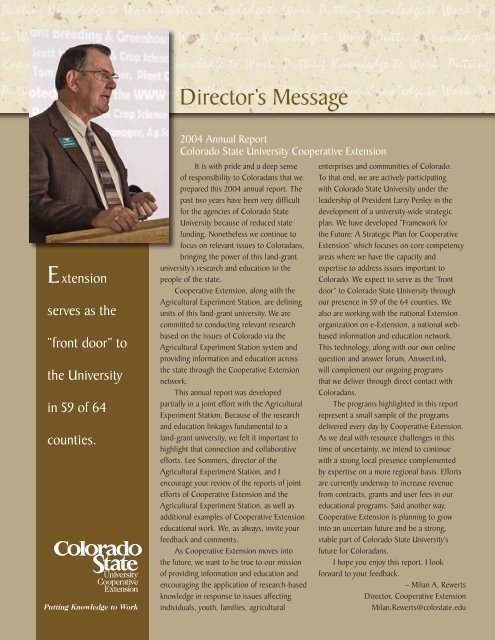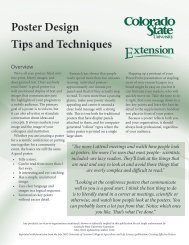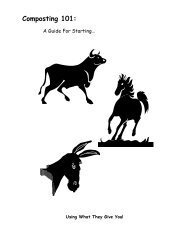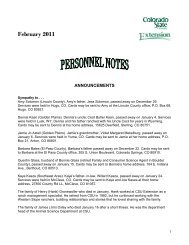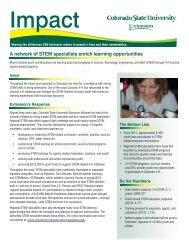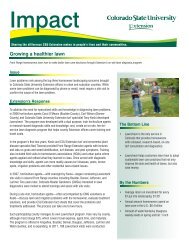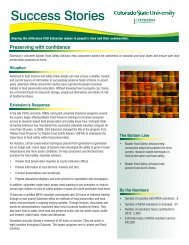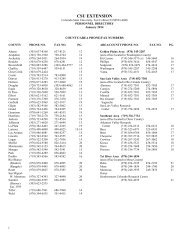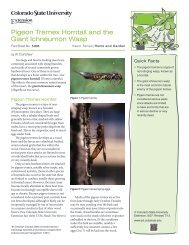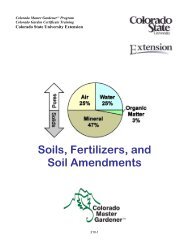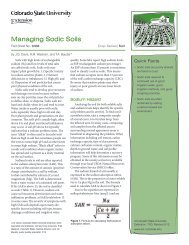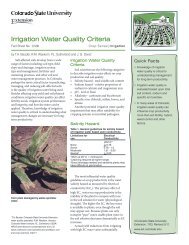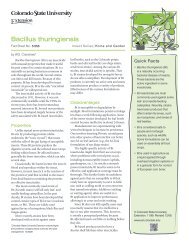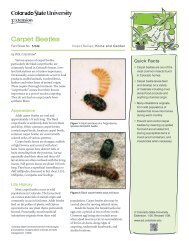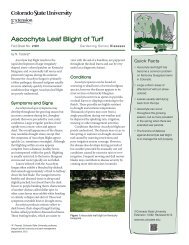Director's Message - Colorado State University Extension
Director's Message - Colorado State University Extension
Director's Message - Colorado State University Extension
You also want an ePaper? Increase the reach of your titles
YUMPU automatically turns print PDFs into web optimized ePapers that Google loves.
Director’s <strong>Message</strong><br />
E xtension<br />
serves as the<br />
“front door” to<br />
the <strong>University</strong><br />
in 59 of 64<br />
counties.<br />
2004 Annual Report<br />
<strong>Colorado</strong> <strong>State</strong> <strong>University</strong> Cooperative <strong>Extension</strong><br />
It is with pride and a deep sense<br />
of responsibility to Coloradans that we<br />
prepared this 2004 annual report. The<br />
past two years have been very difficult<br />
for the agencies of <strong>Colorado</strong> <strong>State</strong><br />
<strong>University</strong> because of reduced state<br />
funding. Nonetheless we continue to<br />
focus on relevant issues to Coloradans,<br />
bringing the power of this land-grant<br />
university’s research and education to the<br />
people of the state.<br />
Cooperative <strong>Extension</strong>, along with the<br />
Agricultural Experiment Station, are defining<br />
units of this land-grant university. We are<br />
committed to conducting relevant research<br />
based on the issues of <strong>Colorado</strong> via the<br />
Agricultural Experiment Station system and<br />
providing information and education across<br />
the state through the Cooperative <strong>Extension</strong><br />
network.<br />
This annual report was developed<br />
partially in a joint effort with the Agricultural<br />
Experiment Station. Because of the research<br />
and education linkages fundamental to a<br />
land-grant university, we felt it important to<br />
highlight that connection and collaborative<br />
efforts. Lee Sommers, director of the<br />
Agricultural Experiment Station, and I<br />
encourage your review of the reports of joint<br />
efforts of Cooperative <strong>Extension</strong> and the<br />
Agricultural Experiment Station, as well as<br />
additional examples of Cooperative <strong>Extension</strong><br />
educational work. We, as always, invite your<br />
feedback and comments.<br />
As Cooperative <strong>Extension</strong> moves into<br />
the future, we want to be true to our mission<br />
of providing information and education and<br />
encouraging the application of research-based<br />
knowledge in response to issues affecting<br />
individuals, youth, families, agricultural<br />
enterprises and communities of <strong>Colorado</strong>.<br />
To that end, we are actively participating<br />
with <strong>Colorado</strong> <strong>State</strong> <strong>University</strong> under the<br />
leadership of President Larry Penley in the<br />
development of a university-wide strategic<br />
plan. We have developed “Framework for<br />
the Future: A Strategic Plan for Cooperative<br />
<strong>Extension</strong>” which focuses on core competency<br />
areas where we have the capacity and<br />
expertise to address issues important to<br />
<strong>Colorado</strong>. We expect to serve as the “front<br />
door” to <strong>Colorado</strong> <strong>State</strong> <strong>University</strong> through<br />
our presence in 59 of the 64 counties. We<br />
also are working with the national <strong>Extension</strong><br />
organization on e-<strong>Extension</strong>, a national webbased<br />
information and education network.<br />
This technology, along with our own online<br />
question and answer forum, AnswerLink,<br />
will complement our ongoing programs<br />
that we deliver through direct contact with<br />
Coloradans.<br />
The programs highlighted in this report<br />
represent a small sample of the programs<br />
delivered every day by Cooperative <strong>Extension</strong>.<br />
As we deal with resource challenges in this<br />
time of uncertainty, we intend to continue<br />
with a strong local presence complemented<br />
by expertise on a more regional basis. Efforts<br />
are currently underway to increase revenue<br />
from contracts, grants and user fees in our<br />
educational programs. Said another way,<br />
Cooperative <strong>Extension</strong> is planning to grow<br />
into an uncertain future and be a strong,<br />
viable part of <strong>Colorado</strong> <strong>State</strong> <strong>University</strong>’s<br />
future for Coloradans.<br />
I hope you enjoy this report. I look<br />
forward to your feedback.<br />
– Milan A. Rewerts<br />
Director, Cooperative <strong>Extension</strong><br />
Milan.Rewerts@colostate.edu
Cooperative <strong>Extension</strong><br />
Funding for Fiscal Year 2004-2005<br />
2004-2005<br />
Cooperative <strong>Extension</strong> Funding<br />
Total Funding = $24,925,950<br />
Appropriated Budget<br />
Cooperative <strong>Extension</strong> is the off-campus educational arm of <strong>Colorado</strong><br />
<strong>State</strong> <strong>University</strong>. The Cooperative <strong>Extension</strong> system, a nationwide educational<br />
network, is a partnership of county, state and federal governments working<br />
cooperatively with the private sector. The Federal Smith-Lever Act<br />
established state <strong>Extension</strong> Services as a third program branch, along with<br />
resident instruction and research, of the land-grant universities in each<br />
state. Cooperative <strong>Extension</strong> agents and specialists are faculty of <strong>Colorado</strong><br />
<strong>State</strong> <strong>University</strong>. They work with local constituents throughout <strong>Colorado</strong><br />
in planning, developing and implementing the educational programs of<br />
Cooperative <strong>Extension</strong>. Volunteers also have an important role in the delivery<br />
of <strong>Extension</strong> programs. Cooperative <strong>Extension</strong> programs serve Coloradans<br />
wherever they live.<br />
Funding for Cooperative <strong>Extension</strong> is provided from multiple sources:<br />
federal, state, county and non-tax monies. Federal funds are allocated to the<br />
states on the basis of law and formula. Additionally, some federal funds are<br />
earmarked to meet special national priority needs. Cooperative <strong>Extension</strong><br />
receives state funds from <strong>Colorado</strong> <strong>State</strong> <strong>University</strong>’s allocation through<br />
the <strong>Colorado</strong> Commission on Higher Education as part of the state’s higher<br />
education budget. County commissioners appropriate annual budget funds<br />
to support the operation of the Cooperative <strong>Extension</strong> office in their county.<br />
Some funds are received from non-tax sources such as program grants and<br />
cost recovery fees.<br />
<strong>Colorado</strong> <strong>State</strong> <strong>University</strong> Cooperative <strong>Extension</strong><br />
Priority Programs<br />
Cooperative <strong>Extension</strong> develops and implements educational programs<br />
in areas of high priority to <strong>Colorado</strong> citizens. For FY ’04-’05, Cooperative<br />
<strong>Extension</strong> has focused its resources on thirteen statewide priority programs:<br />
• Community Development • Water Resource Management<br />
• Livestock Systems<br />
• Small Acreage Management<br />
• Family Resources Management • Crop Systems<br />
• Ag Business Management • Human Development<br />
• Horticulture<br />
• Pest Management<br />
• Nutrition, Diet and Health • Range and Natural Resources<br />
• 4-H/Youth Development<br />
Appropriated Budget = $11,465,576


